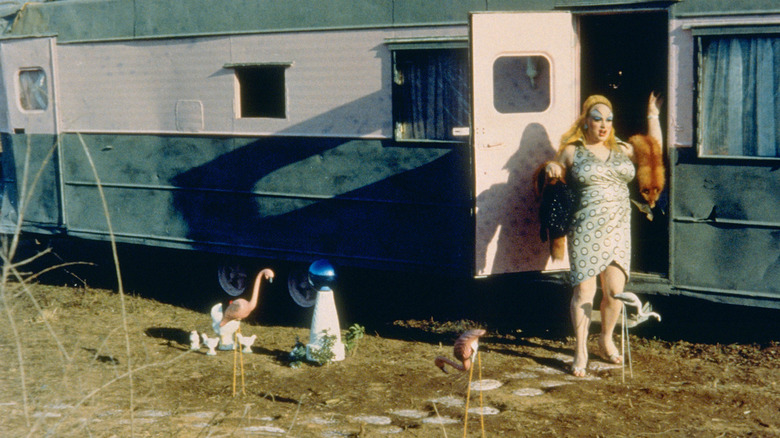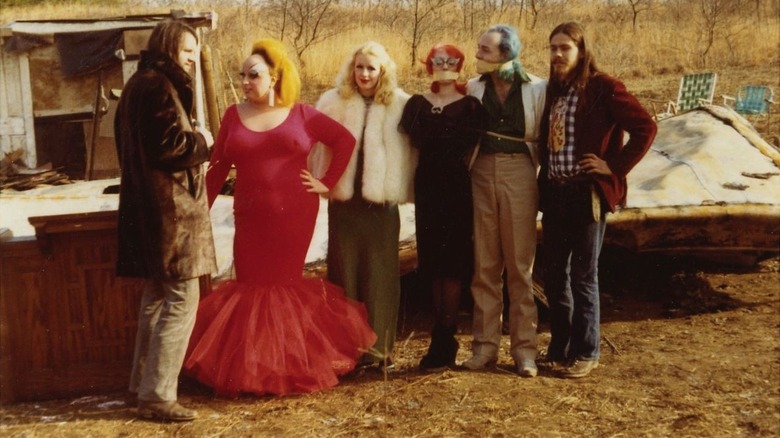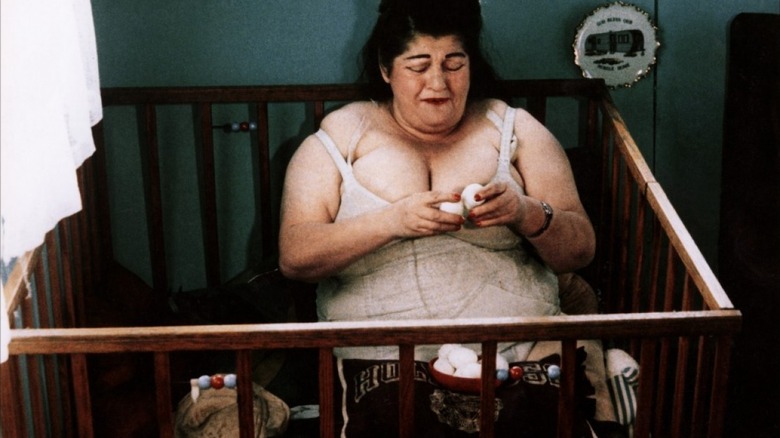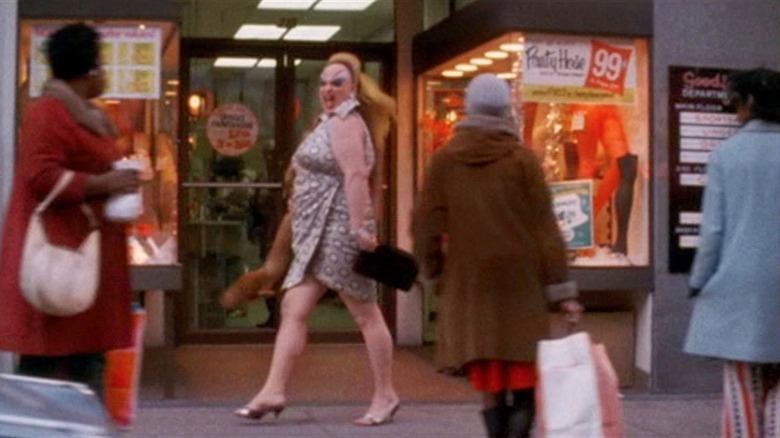Pink Flamingos Ending Explained: The Tyranny Of Normalcy
The magic of John Waters' 1972 cult classic "Pink Flamingos" is that even after decades, it still possesses the power to disgust and repel audiences. Bearing an NC-17 rating — it deserves nothing less — "Pink Flamingos" features copious nudity, cannibalism, assault, vomiting, unsimulated sex, torture, real animal death, and real coprophagy. The characters constantly scream about how much they hate the world, and how wallowing in filth is the only thing that brings them true happiness. Indeed, breaking rules, destroying property, shoplifting, public sexual exposure, and eating poop are acts of blissful, pointedly perverted defiance against a world that demands normality. "Pink Flamingos" is a big queer, naked, punk rock middle finger to the pearl-clutching bourgeoisie.
Waters' movies from the 1970s — "Mondo Trasho," "Multiple Maniacs," "Pink Flamingos," "Female Trouble," and "Desperate Living" — are all essentially supervillain movies. Waters once said in an interview with yours truly (an interview that is sadly now missing from the internet) that Divine's character in "Multiple Maniacs" was more or less Godzilla, an outsize force of destruction that needed to be brought down by the Baltimore police.
And yet, Waters clearly has a deep affection for his caustic, criminal characters. Waters grew up in Baltimore in the 1950s, and, in what might be the squarest neighborhoods imaginable, he found comfort with outsiders. A queer man, Waters found freedom in making movies with low-rent art snobs, poets, weirdos, and drag queens. "Pink Flamingos" feels like something out of Warhol's factory, if Warhol had no money and also a sense of humor. Indeed, Waters' group called themselves Dreamlanders.
When Waters makes a movie about weirdos and outsiders, he is showing us his crowd.
Waters' philosophy
Near the end of "Pink Flamingos," Babs Johnson (Divine) lays out the film's philosophy in plain language: "Kill everyone now! Condone first-degree murder! Advocate cannibalism! Eat s***! Filth is my politics! Filth is my life!" Decency is a canker, society is a sham, and only filth is real.
The story of "Pink Flamingos" is basic to the point of absurdity. In Baltimore, an unseen body has the authority to dub an ambitious citizen as the Filthiest Person Alive. This is a title proudly held by Babs and her disgusting family. She lives in a trailer outside the city, and the members of the Johnson family sneak into town to expose themselves in parks, shoplift meat, and generally be a nuisance. At home, Babs' mother Edie (Edith Massey) whines from a crib that she doesn't get enough eggs. Her son Crackers (Danny Mills) regularly seduces women using chickens, which he crushes in between their bodies. At a birthday party, they kill and eat a cop. A man then performs an act with his ... well, I'm sure you can intuit the rest.
Competing for the crown are Raymond and Connie Marble (David Lochary and Mink Stole), who have an elaborate criminal enterprise. They kidnap women and keep them in a basement where they are forcibly impregnated. They then sell the resulting children to lesbian couples and use the money to keep up an elementary school drug ring. The Marbles hate Babs, and the bulk of the film is devoted to their strange rivalry. One side will smear saliva all over the other's home. The other side will mail bowel movements to the first.
Eggs! Eggs!
"Pink Flamingos" ends with a trial. After the Johnsons and the Marbles have been trading barbs and revolting gifts with one another, the latter has the aggressive idea to burn down Babs' trailer home. This is one toke over the line. While the Johnsons are filthy criminals, they only ever victimize the "real" world, using their mere existence as a challenge to the status quo. The Marbles are poseurs, motivated by their own hate, their own nihilism. There is a cold edge to the Marbles that makes them the clear villains in a world where the heroes eat cops. The Marbles aren't merely filthy. They are cruel.
Eventually, the Johnsons apprehend the Marbles and put them on trial out in a field. They are convicted of "a**hole-ism" and shot to death. In order to elude the police, the Johnsons resolve to change their identities and move on to a new home. They seem excited by the prospect.
The murder of the Marbles is more than Babs asserting her dominance in the field of filth. She is serving a twisted form of justice. Filthy, queer, punk rock defiance is not about hate or pain. It's about anarchy, sex, and the joys of breaking rules. The Johnsons have a politic. And while they may believe in the gospel of "eat s***," they are far from nihilists. The Marbles have no such affection, eager to cause people misery. The Johnsons are selfish sex criminals, but they are our selfish sex criminals.
The girl can't help it
Perhaps taking a cue from the notorious Wizard of Gore himself, Herschell Gordon Lewis, Waters seemingly made "Pink Flamingos" as extreme as possible in order to score publicity. Waters was clearly being deliberately disgusting, making a conscious effort to piss off the Pinks and cater to the gentle perverts of the world. Right underneath the noses of Baltimore's hoi polloi is a filth contest that the average mind cannot fully encompass. On an episode of NPR's "Wait Wait... Don't Tell Me," Waters said that "Pink Flamingos" was taken to court several times on obscenity charges, and that he could never mount any kind of defense. It is, after all, objectively obscene.
There is certainly an integrity to such an aspiration. Any sicko with a camera can film gross things and cut them together as a movie, but Waters possessed a winking love for his characters that makes a film like "Pink Flamingos" transcend from cruelty and aggression into ... dare I say something sweet? John Waters' characters love who they are, they love the filth they wallow in, and they love chaos. They are happy, blissful people who live so far off the grid, the real world has been reduced to something academic. Water built a new world, a filthy Babylon of competitive rule-breaking where common morality has been flipped.
And what's so great about the world, anyway? A world without drugs, a world without queer people, a world without sex or violence? This is not a world worth preserving. The greatest danger is to be an a-hole. Ridding the world of Connie and Raymond Marble keeps filth alive, but rids the world of cruelty. Filth is a way of life, but mean people need not apply. Let's celebrate with a — gulp — meal.



